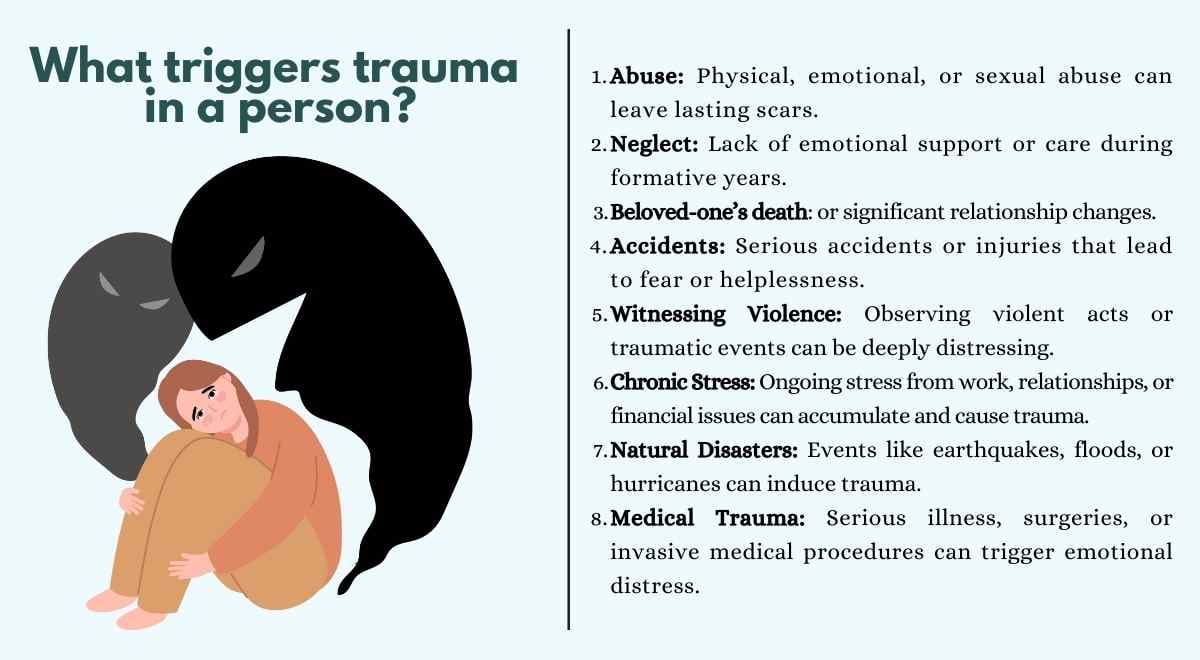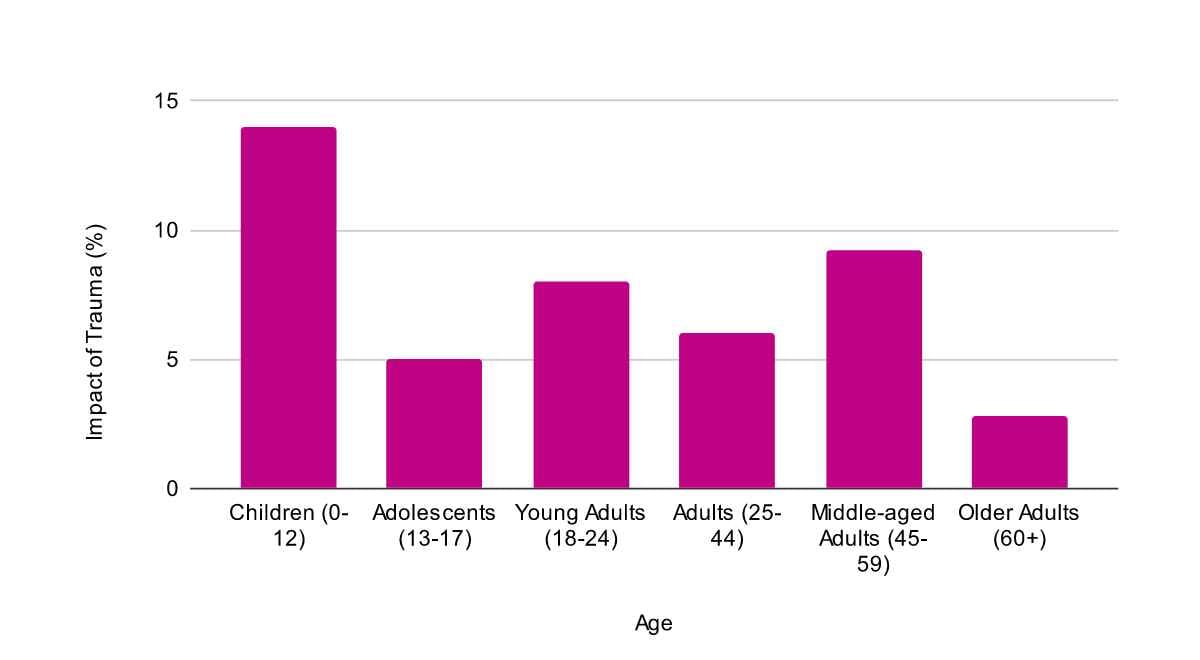Healing from Emotional Trauma: A Step-by-Step Guide
Can you believe that your traumas can shape you into a different person? Sounds bitter right? That’s what truth tastes like!

The Biology Behind Emotional Trauma:
Emotional Trauma in simple terms is a complex phenomenon that affects the sufferer’s brain and body. When a person experiences a traumatic event, their brain chemistry gets altered, which indeed affects the way the brain usually functions. This process goes by the name ‘Fear Circuitry.’
The prefrontal Cortex, a part of our brain responsible for developing action plans gets impaired during emotional trauma, this makes the victim suffer even more when they are to make a decision or to respond to situations effectively.
What triggers trauma in a person?

Even when we humans get exposed to a traumatic event, our brain’s amygdala in our limbic system becomes hyperactive and imprints the traumatic memory deeply. This evokes, a ‘fight, flight, or freeze’ response, our body here prepares to either escape the threat or confront it, and in some rare cases people totally become immobilized.
The hypothalamic-pituitary-adrenal axis aka HPA the stress hormone, experiences an increased level of cortisol.
How does Emotional Trauma Affect your Daily life?
Can you believe that your traumas can shape you into a different person? Sounds bitter right? That’s what truth tastes like!
Your everyday thought process:
Emotional Trauma triggers a negative impact on your cognitive functions, here the survivors often had to deal with intrusive thoughts or their traumatic events as flashbacks. It’s never an easy task to focus in this phase.
- The survivor’s decision-making skills drop down along with their problem-solving ability.
- The survivor feels a heightened sense of depression and anxiety in their daily life.
Picture this, you are trapped in a dark room, forced to watch a horror movie, projected on a huge screen. Every frame is a horror and a haunting memory, this is real for anyone who experiences flashbacks that involve their traumatic past. It feels more like there's no escape to this endless replay.
Appetite and your physical being:
Emotional Trauma manifests physical symptoms which include changes in appetite. Some victims experience a massive loss of appetite, and others cross the limits with their reactions. From the other’s perspective, it might look like it is an overreaction, but in reality, it is nothing but their coping strategy.
This badly results in gastrointestinal problems like stomach aches, or (IBS) Irritable Bowel Syndrome. Not just that, trauma can also cause muscle tension, disturbed sleep patterns, and overall mental and physical well-being.
Emotional Trauma Impacts you and your loved one:
Emotional Trauma doesn't just stop with traumatizing the individual, it also passes the trauma to their loved one, as they are the only support system they can rely on when there's no hope. Loved ones might find it hard to understand and render the needed support to the individual dealing with trauma, as their emotional behavior changes frequently. Even family members find this an overwhelming issue, cause even when they try to come up with a conversation, it ends up as an interaction that causes strain and causes the traumatized individual to emotionally be unavailable.
What Triggers Emotional Trauma?

Post-traumatic events are triggered when a trauma comes to the survivor’s thought process. It can be a small detail such as the Smell of a scent, a sound, music, or a resemblance to a particular situation. For instance, the sound of fireworks triggers a sense of panic in someone who has undergone a traumatic event involving loud noises. When the individual is exposed to the trigger, they feel as if they are reliving the traumatic event, this raises their feelings of helplessness, and a sense of panic along with an outburst of overwhelming emotion.
Trauma-exposed people have two extremes:
i) A phase where they are highly triggered and hurt others.
ii) A vulnerable state where they feel guilty for their hurtful actions and please people.
By setting boundaries, they can limit their conversations and take a step back when they feel overwhelmed. This lets them reflect and analyze their actions carefully so that they can avoid repeating the same mistakes over again. However, if you feel overwhelmed to deal with this emotion all alone, never hesitate to reach out to a professional psychiatrist near you.
Step-by-Step Healing Plan from a Psychologist Perspective for Emotional Trauma
A research from V. Fernandes, Flávia de Lima Osório cities
“Early emotional trauma is a risk factor for anxiety disorders, particularly social anxiety disorder, emphasizing the need for preventive measures and identification of affected individuals.”
Here are some evidence-based structured approaches one can take to heal from their Emotional Trauma from the psychologist’s takeaway.
Processing your trauma involves confronting and writing down the traumatic experience. In short, we call this process “Journalising”, this helps you shift your trauma to the papers, and opens a way to accept emotions, which play a massive part when it comes to healing.
Find the right source for help cause seeking professional help, and look for therapists who are specialized in dealing with the exact trauma you are facing. Get help from a trauma-informed therapist who is trained enough to handle your specific trauma. This makes sure you receive the best remedy tailored to your needs.
Reconnect with Others:
Re-establishing connections with your loved ones during this trauma phase can be the toughest thing, cause when we converse with them, we either end up hurting them or find our traumas overwhelming us. It is advised to take a proper detox, but on the other end, make sure that you hop onto your friends and loved ones, and share your updates on who you overcame and what you were struggling with on a positive note.
If you are unable to converse with them, be open with the communication. After all, our friends and loved ones were where when we were laughing, they had all right to listen to our vents and our personal progressing achievements too.
Focus on the living moment, not the future:
Letting go of the past is not an easy thing to do at all, but on the contrary positive aspects still exist. Focus only on the present moment, do not think anything about the future. When you think more about the future, you will embrace anxiety. When trauma is the root, anxiety is the fruit.
Engaging in Enjoyable Activities:
Participate in an activity that lets your soul enjoy who you are, it might be reading a book, fantasy novel, a manga. Or it might be a minimal activity like gardening or listening to binaural beats that lift your mood and energy, to balance normalcy and joy.
Positive Self-Talk:
A cycle of unstoppable negative self-talk is what a trauma-affected person would face when they are triggered by trauma-related memory. It is a harder task to think about the positive memories and move on from the issue as if nothing has happened. But in advance, one can repel their negative self-talk with positive affirmations to rebuild self-esteem and cope with trauma-induced beliefs.
Learning about the trauma
Learning more about your trauma can help you understand how your trauma works, it relates to your experiences and this makes you feel less alone in your healing phase. After all, knowledge is power, right?
Practicing Forgiveness:
This doesn’t mean to condone harmful actions, but to set yourself free from the burden of resentment, which can be a healing phase for some individuals.
Therapeutic Techniques:
Therapy actually works, cause when you go to therapy, weeks after weeks, and when someone asks you to lean forward to every inch of emotion you deal with. You will feel comfortable to open up, when you open up you feel guilty, emotional, upset, or ashamed there’s someone to tell you, ‘It’s alright! Now let’s see how we can deal with it.’ As an expert in the profession, they will be a good listener without forcing you with advice, instead, they listen and give you preventive steps which can help you face your emotions.
1. Cognitive Processing Therapy, shortly known as CBT helps in modifying the unhelpful beliefs linked to the trauma and understanding the impact it lays on one’s viewpoint.
2. Prolonged Exposure slowly exposes the trauma victims to their trauma-related memories and situations, but reduces their distressing impact.
3. TF-CBT abbreviated Trauma-Focused Cognitive Behavioral Therapy combines CBT and utilizes exposure therapy techniques to their best (This is a very good therapy technique that works best for PTSD.)
4. Eye Movement Desensitization and Reprocessing shortly known as EMDR makes use of bilateral stimulation which helps in altering the way traumatic memories are stored in the victim’s brain.
Create a safe Environment:
Whenever someone is held back from a traumatic experience, the first thing they lack to see is positivity. If you think the only thing they lack is positivity, then you are wrong. They also lack a sense of safety in their environment.
This is where therapists work their best to foster a strong sense of safety and trust with their clients. These techniques make sure of the fact that they are still in a safe place, and not just stuck in a grounded phase where they feel as if they are dominated by their past or by their negative emotions. This lets the trauma-affected person know that they are not presently in the past, thereby they open up.
Well if you have decided to heal on your own, here are some techniques you can try:
Regular physical activity doesn’t just stop making the body remain in a better shape, it also helps the survivor to release endorphins, thereby reducing stress.
“Self-care activities work well” We might be tired of listening to this phrase to an extent where it sounds very cliché, but did you know self-care directly links a positive impact on your prefrontal cortex, amygdala, Nucleus accumbens, and hippocampus?
NOTE: Self-care and self-love nourish the brain, especially for boosting mood, memory, and focus. Balance is key, as excessive self-love can blur the lines. Prioritizing oneself excessively might promote "selfishness" rather than healing. This can disregard other’s opinions. Remember, self-care is not a concept that supports self-centeredness.
Avoiding recreation and sorting out with Coping Strategies:
You can’t find real happiness at the bottom of the bottle, so never indulge in the frequent use of alcohol or any substance that seems be appear like a temporary solution.
Mindfulness works actually:
A research done by Shauna L. Shapiro on cultivating mindfulness cites the following abstract.
'Cultivating mindfulness through meditation-based interventions can lead to reduced perceived stress and rumination, potentially improving overall well-being.'
People often say only meditation works, but do you know that people who maintain a streak in mindfulness are more beneficial compared to the people who engage only in meditation? This practice specifically encourages the present-moment awareness and thereby the anxiety is reduced.
Instead indulge in creativity:
People who engage themselves in art, music, or writing find it easier to improve psychological outcomes and this provides a healthy outlet to express their emotions.
A Breakdown of Trauma in Different Age Groups:

When Emotional Trauma isn’t addressed or given proper treatment, it leads to long-term effects that impact the traumatized individual.
Emotional Trauma has a deep-rooted story that links with your childhood. In short, we can say this is childhood emotional neglect, this happens when the child is given inadequate emotional support or validation for a set of years, but this lets the child question their own self-worth.
As the traumatized individual grows up, they will more likely experience emotional neglect in their married life. The impact can stress the individual to the core level, this often leads to trauma bonding, which is a phenomenon where a victim develops an unhealthy attachment with the abuser as a coping technique. The gradual nature of neglect trauma relies on its own ability to corrupt one’s sense of security. If untreated at the initial stages, this might cause difficulties in emotional resilience and self-compassion. Through proper therapy, and self-care you can reclaim your emotional well-being. It is even possible to overcome the lasting effects of neglect trauma.
Conclusion:
Trauma is a tempest, bad things occur and re-occur, but on a happy note, there are measures to reduce its impact on your life. Even in the worst storms, the most fragile flowers survive, if they can survive, you can too! Strong people like you keep trying to find a way out of their imbalances, and that is one reason why you've landed in this blog. Your life truly matters! Trauma is an energy-consuming process so be gentle with yourself and take rests to recharge, but never give up.

Comments ()